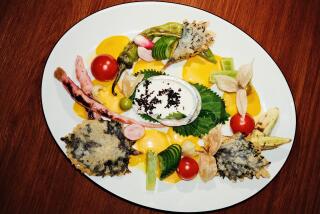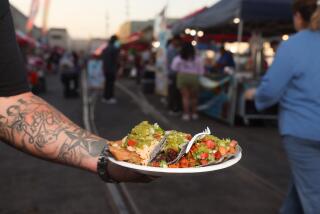Taco Bell Replaces Chief, Chihuahua as Sales Fall
Taco Bell Corp., struggling to reverse a dramatic decline in sales, replaced its top executive Tuesday and is muzzling its quirky talking Chihuahua advertising icon.
The moves were announced by parent company Tricon Restaurants International, which also said sales at Taco Bell restaurants open at least a year tumbled 6% in the second quarter, the largest quarterly decline ever for the nation’s largest Mexican-style fast-food chain.
“I realized that fundamental change at Taco Bell was necessary,” said Tricon Chairman David E. Novak, whose company also owns the Pizza Hut and KFC chains.
Emil Brolick, a 12-year veteran of Wendy’s International Inc., replaces Peter C. Waller, president of the Irvine-based chain since 1997. Novak would not say whether Waller had been fired, saying only that he “will be leaving the company to pursue other interests.”
But the most notable victim of the shake-up may be the Chihuahua, a fast-food icon famous for mouthing the words “Yo Quiero Taco Bell” (I want Taco Bell) in the chain’s ads.
Taco Bell is hiring a new advertising agency to overhaul its marketing efforts, shelving TBWA Chiat/Day, which introduced the Chihuahua after winning the chain’s s $200-million advertising account in 1997.
Novak said the chain does not expect the Chihuahua to play a prominent role in new campaigns. “He may have a cameo role but I wouldn’t be surprised to see advertising that didn’t have him,” Novak said.
He said Taco Bell’s new president, Brolick, 52, helped boost same-store sales at Wendy’s, the nation’s third-largest hamburger chain, by successfully introducing several new products. He was senior vice president of strategy at the Dublin, Ohio-based company, which posted a 7.9% gain in same-store sales last year and reported that sales have climbed 3.3% so far this year.
Still, industry experts expressed surprise at the selection of Brolick to run Taco Bell, which has nearly 7,000 locations nationwide.
“Taco Bell is a multimillion-dollar business and you would think they would search for somebody with chief executive experience,” said Randall Hiatt, president of Irvine-based Fessel International, a restaurant consulting firm. “They’ve traditionally had the management depth to do it internally.”
Waller, who became president of Taco Bell in 1997 when PepsiCo Inc. spun off its restaurant holdings, could not be reached for comment Tuesday. Although Novak would not provide details of Waller’s departure, Hal Sieling, a Carlsbad-based restaurant industry consultant, said a 6% drop in same-store sales is “enough to get fired over.”
“It’s really tough because you have to keep hitting home runs and there aren’t a lot of companies that can keep on doing that,” Sieling said.
Taco Bell’s decision to shelve the Chihuahua ads apparently stems from concerns that they were not focusing enough on menu items, Hiatt said. But in the process, Taco Bell “has kind of downplayed a successful ad campaign that was on everybody’s mind,” he said.
TBWA Chiat/Day denied that its creative work--including the “Yo Quiero Taco Bell” tag line--had lost its bite.
“When we had strong product, [the Chihuahua] was strong,” said Tom Carroll, president of TBWA Chiat/Day’s Los Angeles office. “Those things go hand in hand.”
The ads, introduced early in 1998, turned the Chihuahua and the tag line into a national phenomenon. Consumers lined up to buy plush Chihuahua toys at Taco Bell stores, and late-night talk show hosts incorporated the dog into monologues.
Early in 1999, Novak maintained that “people only get tired of boring ads. If we can keep it exciting, [the Chihuahua] can last forever.”
But the dog has faded from Taco Bell ads in recent months, and the chain instead has used its commercials to hammer away at low pricing designed to drive business.
Some restaurant industry observers, however, say Taco Bell’s emphasis on low prices might be a risky interim strategy. “In the fast-food category, you generally try to stay away from pricing,” one ad industry executive said. “Products and promotions drive loyalty, not low prices. You generally want to stay away from that kind of thing.”
Taco Bell said Tuesday that it would return all of its advertising to Foote, Cone & Belding Worldwide’s Southern California office. FCB has been handling media buying and regional advertising for Taco Bell, and the agency handled all of the chain’s advertising during the late 1980s and early 1990s.
Taco Bell described that period as the “strongest growth period” in its history.
FCB will be charged with returning Taco Bell to the “top of mind” status it once enjoyed with fickle fast-food consumers, most notably younger males who eat most of the take-out food sold in the U.S. The agency’s creative staff faces a tough challenge because competing chains continue to spend heavily to develop and advertise products.
FCB’s “immediate challenge is to give us a fresh creative approach to help improve sales trends,” Novak said.
Carroll said the Taco Bell loss was painful: “This one was tough because we were doing the job in spades.” He added that the Taco Bell loss wouldn’t result in layoffs. “We’re busy, so we’ll have enough work to take care of everybody.”
An FCB spokeswoman did not return a telephone call seeking comment on the new account.
Tricon also said Tuesday that second-quarter profit from continuing operations rose 16% to $113 million, or 76 cents a share, beating estimates of 71 cents. Results were boosted by improved sales at Pizza Hut while same-store sales at KFC declined 3%.
Revenue fell 12% to $1.66 billion as Tricon sold more restaurants to its franchisees.
*
Bloomberg News was used in compiling this story.
More to Read
Inside the business of entertainment
The Wide Shot brings you news, analysis and insights on everything from streaming wars to production — and what it all means for the future.
You may occasionally receive promotional content from the Los Angeles Times.










